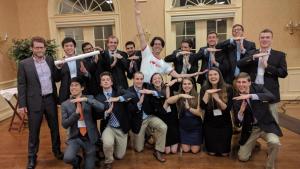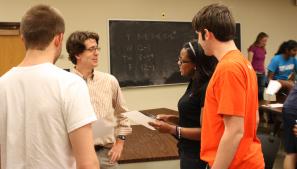Technology Leaders Program
Interdisciplinary. Design. Collaboration. Integration. Data. Innovation. Technology. These are some of the words that provide a foundation for the Technology Leaders Program (TLP), an interdisciplinary undergraduate program focused on developing engineering leaders who can bring both a top-down systems perspective and bottom-up component perspective to the problems they face: problems that are increasingly complex and require solutions that are responsive to rapidly changing needs.

The TLP is home to the Design Integration Minor, an integrated, interdisciplinary learning experience for engineering students preparing them to work on teams designing, prototyping, and implementing complex systems.
Students in the TLP gain foundational knowledge from Systems and Information engineering (top-down perspective) and domain-specific fields such as Electrical, Computer, and Mechanical engineering (bottom-up perspective) in route to a major in one of these fields. In addition, they gain multiple opportunities to integrate their knowledge of these fields through hands-on TLP courses, the TLP Learning Community, and internships with TLP-partnered companies.
Technology Leaders Program Faculty

Joanne Bechta Dugan
Joanne Bechta Dugan is Professor Emerita of Electrical and Computer Engineering. Her research focuses on assessment of the dependability of computer-based systems—she developed the dynamic fault tree model, which extends the applicability of fault tree analysis to computer systems. Current work focuses on interdisciplinary courses in robotics.

Gavin Garner
Gavin Garner joined the University of Virginia faculty in 2009. He holds a bachelor’s degree in Physics from Colby College and Master’s and Ph.D. degrees from the University of Virginia in both Mechanical and Aerospace Engineering.

Barry Martin Horowitz
Dr. Horowitz joined the University of Virginia’s faculty as a Professor in the Systems Engineering degree program in September 2001, after an industrial career involving the application of systems engineering to many large and complex systems. He assumed the role of Department Chair in 2009.

Brian L. Smith, PE
Brian L. Smith, PE is a leader in advanced technology in surface transportation systems - specifically "connecting" the infrastructure to travelers to improve transportation safety and efficiency. His research has contributed to innovations such as mobile phone navigation systems and urban freeway management.
TLP Current Student Portal
Current students can access important TLP information through the links below.
Prospective Students
The Technology Leaders Program (TLP), home to the Design Integration Minor, is an exciting, innovative program that develops valuable knowledge and skills by integrating systems level thinking and electrical, computer and mechanical engineering concepts.
By participating in the TLP and the Design Integration Minor, you will get a jump-start on developing abilities typically only acquired through years of experience after graduation; abilities such as being able to collaborate effectively with engineers from other majors and being able to both design and integrate components into systems.
The TLP and the Design Integration Minor are geared towards students who want to:
- Learn to take ideas and turn them into tangible, high-quality systems.
- Design real-world, complex "smart" systems that generate, store, process, and act upon data.
- Do design throughout their undergraduate education, not just during their capstone project or during their major design experience.
- Connect and network with people from TLP internship partner companies.
- Extend their learning beyond traditional departmental boundaries.
- Be part of a small, close-knit program where you get to know your peers and faculty better.
Systems Engineering
Systems Engineering students get to not only model data, but also build systems that generate and act upon that data.
- You will stand out amongst your fellow Systems classmates by gaining depth of knowledge in technology-oriented fields (electrical, computer, and mechanical engineering)
- You will gain experience designing systems that have both software and hardware - which will really differentiate you from your peers.
- You may complete your application sequence (a required part of the Systems curriculum) through the TLP
Electrical and Computer Engineering
Electrical and Computer Engineering students get to integrate your programming with the physical world and your circuits into actual products
- You will differentiate yourself from your fellow ECE students by gaining integration skills and a deeper understanding of how to apply your domain-specific ECE knowledge to develop real systems.
- You can satisfy technical and/or unrestricted electives through the Systems Engineering courses taken as part of the TLP curriculum!
- You will take part in hands-on activities and projects pertaining to your major in combination with systems-level thinking.
Benefits of participating in the TLP
- Improve your marketability – companies seek graduates who not only have deep technical skills, but also the skills and knowledge developed through the TLP: teamwork, systems-level thinking, and the ability to be effective on interdisciplinary teams.
- Work on hands-on projects... and with people who are passionate about design and making.
- Establish a closer working relationship with knowledgeable and well-connected professors.
- Get to know a small group of students who share the same interests and goals as you.
A concept adapted from leaders in design-thinking (Tim Brown of IDEO), a T-shaped engineer is someone who contributes both at the component level and the system leve. As discussed in the TLP Video, the TLP prepares you to be two kinds of T-shaped people.
- a T-shaped person is able to combine the knowledge and skills more focused on component design (e.g., mechanical, electrical or computer engineering) with those more focused on integration (e.g., systems engineering).
- a T-shaped person has deep knowledge of their discipline and can work with people who have deep knowledge in other areas
The TLP helps you to develop these skills, which are highly sought after by companies.
The TLP is all about educating students to be T-shaped people -- both collaborating specialists from different majors and complementary partners working at both component and systems integration levels.

UVA Technology Leaders Program
Reid Bailey, TLP Founding Director, offers introductory information about the program.